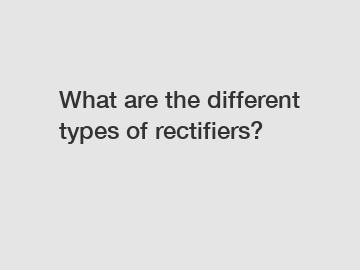What are the different types of rectifiers?
What are the different types of rectifiers?
A rectifier is an essential electrical component that converts alternating current (AC) into direct current (DC). It plays a crucial role in various industries and household appliances where direct current is required to power devices. There are several different types of rectifiers, each with its own unique characteristics and applications. In this article, we will explore the various types of rectifiers and their functions.
1. Half-Wave Rectifier:

The half-wave rectifier is the simplest form of a rectifier and is commonly used for low power applications. It consists of a diode connected in series with the load and converts only the positive half-cycles of AC input into DC output. However, it is inefficient as it utilizes only half of the power input.
2. Full-Wave Rectifier:
Unlike the half-wave rectifier, the full-wave rectifier utilizes both the positive and negative half-cycles of AC input to produce a DC output. It can be further categorized into two types: center-tapped and bridge rectifiers.
- Center-Tapped Full-Wave Rectifier:
The center-tapped full-wave rectifier employs a transformer with a center-tapped secondary winding. It uses two diodes to produce a DC output by conducting during alternate half-cycles. While it is relatively simple and cost-effective, it has limitations in terms of voltage regulation.
- Bridge Rectifier:
The bridge rectifier is a widely used rectifier circuit that doesn't require a center-tapped transformer. It uses four diodes arranged in a bridge configuration to rectify both halves of the AC input signal. This results in a more efficient and compact design, making it suitable for various applications.
3. Bridgeless Rectifiers:
The bridgeless rectifier is an advanced rectifier topology that eliminates the need for diode bridges. By utilizing power electronic switches, such as thyristors or MOSFETs, it offers improved power factor correction and reduced losses. Although more complex and expensive, it provides higher efficiency and better performance.
4. Voltage Multiplier Rectifier:
Voltage multiplier rectifiers are primarily used in applications that require high DC voltages. They employ a ladder network of capacitors and diodes to multiply the peak AC voltage levels, resulting in an amplified DC output voltage. The cascade connection of voltage multiplier stages allows for generating significantly higher voltages.
5. Switched Mode Rectifiers:
Switched mode rectifiers involve the use of switching devices, such as transistors or thyristors, to control power flow. They employ high-frequency switching techniques to convert AC to DC. These rectifiers offer several advantages, including smaller size, lighter weight, and higher efficiency. Switched mode rectifiers are commonly used in modern power supplies, computers, and telecommunication equipment.
In conclusion, rectifiers are crucial components in converting AC to DC for various applications. While the half-wave rectifier and full-wave rectifier, including the center-tapped and bridge rectifiers, are commonly used in different scenarios, bridgeless rectifiers offer improved performance. Additionally, voltage multiplier rectifiers and switched mode rectifiers serve specific requirements in terms of high voltage and efficiency. Understanding the various types of rectifiers enables engineers and designers to select the appropriate type based on the specific needs of their applications.
If you want to learn more, please visit our website rectifier module price, huawei r4875g, eltek flat pack.
166
0
0


Comments
All Comments (0)